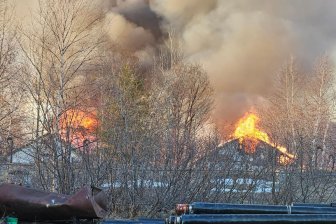With respiratory infections, colds and the flu making waves — and headlines– across Canada, the Northwest Territories is bracing for a hit, while the Yukon hasn’t seen a ripple and Nunavut reports they were hit months ago.

Frequent travel done between the NWT and Alberta for work and health services has the territorial government looking south, and not liking what they see as respiratory viruses take a toll on the health system in Alberta.
“The (chief public health officer) is expecting a high amount of respiratory illness in the NWT in the coming weeks, especially as people travel for the holidays and many events move indoors and in smaller spaces,” said Jeremy Bird, spokesperson for NWT’s Department of Health and Social Services.
“However, if people stay home when they are sick, get vaccinated when they can and follow healthy habits, the CPHO (Office of the Chief Public Health Officer) does not expect high incidences of severe outcomes.”
NWT has made public service announcements encouraging residents to get a flu shot and be up to date on COVID-19 boosters amid concerns about a potential rise in cases — and the impact a surge could have on the territory’s health-care system.
Respiratory illnesses hit off-season in Nunavut this year — in the spring and summer, forcing the territorial government to start its Palivizumab vaccination program for respiratory syncytial virus (RSV) in May when faced with a spike in respiratory infections along with colds and flu. The program ran through August until levels returned to summer normals.
Hoping to prevent a new wave from taking hold this season, the government launched its flu shot program in October along with a plea for Nunavummiut to get up to date on their COVID-19 vaccines and on Nov. 15, restarted the RSV vaccine campaign.
“This past June, (the territorial government) expanded its eligibility criteria for the Palivizumab program, which may yield a higher than average uptake of the vaccine,” said Danarae Sommerville, who is with Nunavut’s health department.

Palivizumab is a monoclonal antibody that provides passive immunization against the respiratory syncytial virus and requires a monthly shot for optimum protection. It’s given to children under age two who are at high risk for lung infections, including those who were born premature.
Health officials have also sounded the alarm that a stomach bug is raging through Cambridge Bay, a community of 1,800 on Victoria Island. A PSA campaign is being circulated telling households to wash all laundry at the hottest temperature and avoid sick people cooking for the family.
Virus season in that territory is compounded by higher-than-average rates of tuberculosis. Pangnirtung, a hamlet of 1,500 on Baffin Island, continues to deal with an outbreak that began in 2021.
- Naloxone-resistant street drug linked to 9 deaths in Eastern Canada seized in Alberta
- ‘She gets to be 10’: Ontario child’s heart donated to girl the same age
- Buzz kill? Gen Z less interested in coffee than older Canadians, survey shows
- Bird flu risk to humans an ‘enormous concern,’ WHO says. Here’s what to know
Ottawa pledged in 2018 to wipe out TB in Inuit communities by 2030. Nunavut Tunngavik Inc. – the organization tasked with holding the federal and territorial governments and Inuit to their respective obligations under the Nunavut Agreement that created the territory – is in charge of administering the Nunavut Tuberculosis Elimination Action Plan. It includes addressing overcrowded housing, poor ventilation, and inadequate access to nutritious food – factors that make Nunavummiut vulnerable to higher rates and severity of respiratory illnesses.
The Yukon also rolled out its flu vaccine program as usual in mid-October, with high-risk people and seniors getting first dibs and all other Yukoners being eligible for shots as of Oct. 31.
Katharine Erwin with Yukon Health and Social Services said as of Nov. 10, there are no cases of RSV confirmed in the territory — a stark contrast to some parts of Canada reporting a spike in infections, stressing health systems.
While a shortage of over-the-counter and prescription medication is being felt across Canada, it’s worse in some regions of the north.
“It’s harder than in places down south,” said Mia Manalo, a pharmacist at Iqaluit Valupharm Drugs. She said for the past few weeks, she has ordered various medications for the pharmacy that show online as being available, but when the shipment arrives a week or more later, some items are missing.
“So you’re having to re-order and re-order” as the stock shrinks, she said, noting it hasn’t been the case for life-saving drugs.
In the NWT, Bird said a new 811 service and community health centers can provide several medications if they’re in short supply in a community.
“Inventory of these medications is being closely monitored and have not hit a point where we have zero supply in any community, however, supply shortages continue and may limit the amount that is able to be dispensed to individuals,” Bird said.
Supply issues have been reported in the Yukon as well, but details were not readily available.




Comments